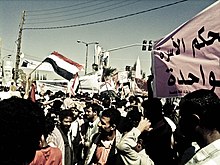Modern history of Yemen
In 1839 the British set up a protective area around the southern port of Aden and in 1918 the northern Kingdom of Yemen gained independence from the Ottoman Empire.
Shortly after assuming power in 1962, Ahmad's son, the Imam Muhammad al-Badr was deposed by revolutionary forces, who took control of Sana'a and created the Yemen Arab Republic (YAR).
Saudi Arabia and Jordan supported Badr's royalist forces to oppose the newly formed republic starting the North Yemen Civil War.
By 1968, following a final royalist siege of Sana'a, most of the opposing leaders reached a reconciliation and Saudi Arabia recognized the Republic in 1970.
Following Nasser's creation of the United Arab Republic, attempts to incorporate Yemen in turn threatened Aden and the Protectorate.
In January 1967, there were mass riots by NLF and FLOSY supporters in the old Arab quarter of Aden town, which continued until mid February, despite the intervention of British troops.
The temporary closure of the Suez Canal in 1967 effectively negated the last reason that British had kept hold of the colonies in Yemen, and, in the face of uncontrollable violence, they began to withdraw.
Order was restored by the British, mainly due to the efforts of the 1st Battalion Argyll and Sutherland Highlanders, under the command of Lt-Col. Colin Mitchell.
In June 1969, a Marxist wing of the NLF gained power and changed the country's name to the People's Democratic Republic of Yemen (PDRY) on 1 December 1970.
The PDRY established close ties with the Soviet Union, the People's Republic of China, Cuba, and Palestine.
Strong support from Moscow resulted in the Soviet Navy gaining access to naval facilities in South Yemen.
Although the governments of the PDRY and the YAR declared that they approved a future union in 1972, little progress was made toward unification, and relations were often strained.
The fighting was short-lived, and led to the Cairo Agreement of October 28, 1972, which put forward a plan to unify the two countries.
[1][2][3] Fighting broke out again in February and March 1979, with South Yemen allegedly supplying aid to rebels in the north through the National Democratic Front and crossing the border.
The goal of unity was reaffirmed by the northern and southern heads of state during a summit meeting in Kuwait in March 1979.
The head of Islaah, Paramount Hashid Sheik Abdallah Bin Husayn Al-Ahmar, is the speaker of Parliament.
Continuous negotiations between northern and southern leaders resulted in the signing of the document of pledge and accord in Amman, Jordan on 20 February 1994.
Almost all of the actual fighting in the 1994 civil war occurred in the southern part of the country despite air and missile attacks against cities and major installations in the north.
The United States strongly supported stopping the war and called for a cease-fire and a return to the negotiating table.
Ali Nasir Muhammad supporters greatly assisted military operations against the secessionists and Aden was occupied on 7 July 1994.
Early during the fighting, President Ali Abdallah Salih announced a general amnesty which applied to everyone except a list of 16 persons.
In the aftermath of the civil war, YSP leaders within Yemen reorganized the party and elected a new politburo in July 1994.
In the 2000s the government has been fighting rebel groups such as the one led by Hussein al-Houthi's Zaydi movement Shabab al-Mu'mineen, "The Young Believers".
The protests were initially against unemployment, economic conditions and corruption, as well as against the government's proposals to modify the constitution of Yemen.
In a "Friday of Anger" on 18 February, tens of thousands of Yemenis took part in anti-government demonstrations in Taiz, Sana'a and Aden.
The agreement included immunity for him and his family and further required the opposition to stop public protests and join a coalition with Saleh's ruling party.
Saleh and several others were injured and at least five people were killed by a 3 June rocket attack on the presidential compound when ordnance struck a mosque used by high-level government officials for prayer services.

